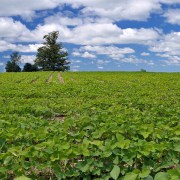 Photo: Getty Images
Photo: Getty Images
When you are concerned about maintaining your health it is natural to do everything you can to avoid getting sick. That means eating lots of fruits and vegetables, exercising regularly and getting plenty of sleep.
When it comes to nutrition, the amount of conflicting consumer information can be dizzying at times. Choosing healthy foods can feel like running a nutritional gauntlet.
This is especially true for thousands of men and women who have survived cancer. That’s because some plants we eat can mimic the female hormone estrogen, such as seeds and nuts, beans, grains, and some fruits and vegetables. The tricky part is estrogen is also implicated in certain types of cancer, including breast, uterine and ovarian in women and prostate cancer in men.
To this end, one of the most controversial foods is soy.
Soybean products are touted for their protective properties in breast, prostate, colon and lung cancers. These protective benefits are thought to be due to isoflavones, called phytoestrogens, that weakly mimic estrogen produced in humans and animals. Soy is consumed in large quantities in Asia, which may account for why Asian women have lower breast cancer rates.
So is soy healthy or not?
As a protein source, soybean products are promoted here and abroad as a healthier alternative to meat and as a suitable aid for weight loss. Soy protein in a diet low in saturated fat and cholesterol is also promoted as a method to help reduce the risk of heart disease, according to the American Cancer Society.
Soy products are also used to lower cholesterol and blood pressure, and to relieve disruptive symptoms of menopause and osteoporosis.
For breast cancer survivors, the benefits aren’t as clear-cut. Studies measuring the effect of soy on breast cancer recurrence and mortality have been conflicting, with some showing soy reducing risk, while others demonstrating elevated risk among frequent soy eaters.
Even among people who have never had cancer, some large population studies suggest a human benefit from high levels of phytoestrogens in the diet, while animal studies have noted that extremely high amounts of phytoestrogens may actually promote breast cancer and uterine cancer.
Dr. Otis Brawley, chief medical officer for the American Cancer Society says for a person at average risk of breast cancer, it's not whether soy is beneficial, it’s the amount and type of phytoestrogens you are getting in your diet.
“There is a difference between high levels of natural phytoestrogens in the diet and the very high doses in dietary supplements. It is very reasonable for a person at average risk of breast cancer to eat a moderate amount of soy products, such as tofu, soy butter, soy nuts, and soy burgers, as part of an overall well-rounded healthy diet,” he said.
In the current issue of Cancer Prevention Research, a journal of the American Association for Cancer Research, Seema A. Khan, M.D., professor of surgery at the Robert H. Lurie Comprehensive Cancer Center of Northwestern University found soy supplements had no protective effect against breast cancer. In premenopausal women, the supplements actually worsen cancer cell growth.
“Simply put, supplements are not food. Although soy-based foods appear to have a protective effect, we are not seeing the same effect with supplementation using isolated components of soy, so the continued testing of soy supplements is likely not worthwhile,” said Khan in a written statement.
A 2009 study conducted by Vanderbilt University and the Shanghai Institute of Preventive Medicine, and published in the Journal of the American Medical Association, found breast cancer survivors, ages 20-75, who ate moderate amounts (15.3 grams) of naturally occurring soy protein daily -- about the amount found in three-quarters of a cup of edamame -- had lower cancer recurrence and mortality than their study counterparts whose soy intake was less than 5.3 grams daily.
Dr. Larry Norton, medical director of the Evelyn Lauder Breast Center at Memorial Sloan-Kettering Cancer Center in New York City tells Time the Vanderbilt study may show soy isn’t harmful for cancer survivors, but it isn’t carte blanche to “go out and eat as much soy as you can" either.
Lynette Summerill, an award-winning writer and scuba enthusiast lives in San Diego, CA with her husband and two beach loving dogs. In addition to writing about cancer-related issues for EmpowHER, her work has been seen in newspapers and magazines around the world.
Sources:
Eating soy is safe for breast cancer survivors. Alice Park. Time. 8 December 2009. Accessed online 8 February 2012 at:
http://www.time.com/time/health/article/0,8599,1946283,00.html#ixzz1lpjZkmNg
Soybean. American Cancer Society. Accessed online 8 February 2012 at: www.cancer.org/Treatment/TreatmentsandSideEffects/ComplementaryandAlternativeMedicine/DietandNutrition/soybean
Soy Isoflavone Supplements Did Not Provide Breast Cancer Protections. American Association for Cancer Research. Jeremy Moore. 3 February 2012. Accessed online 8 February 2012 at:
http://www.aacr.org/home/public--media/aacr-press-releases.aspx?d=2682
Reviewed February 16, 2012
by Michele Blacksberg RN
Edited by Jody Smith





Add a CommentComments
There are no comments yet. Be the first one and get the conversation started!